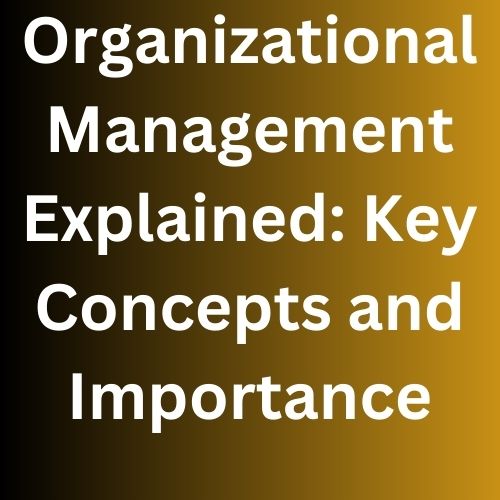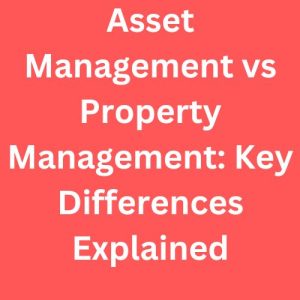
Organizational Management
Definition and Scope of Organizational Management
Organizational management is referred to regulating resources or planning organizing in order to accomplish organizational objectives and leading. To ensure efficiency and effectiveness organizational management is all about managing staff operations. It involves performance assessment or dispute resolution or strategic planning or communication and organizational development. It helps in managing organizational structure or changing business environment and culture and change.
Historical Background of Organizational Management
Organizational management is an organizational structures that originated from ancient civilizations. In the 18th and 19th centuries during the industrial revolution the modern organizational management begun. The standardization process and efficiency principles is focused on the scientific management of Frederick Taylor. The theories of management is shaped from Peter Drucker and Elton Mayo from the 20th century. The global competition and the technological advancements is changing business environments to adapts to the organizational management today. The resource coordination and decision making for an effective leadership is crucial.
Core Principles of Organizational Management
Strategic Planning
Creating goals and assigning resources are involved in deciding what to do. Adjusting to outside changes and maintaining focus in making the wise decisions supports the organizations. The sustainable development long term objectives with resources and actions consistently matches each other.
Resource Allocation
Materials and time or people and cash includes the use of resources to describes the allocation effective. Making decisions and priorities setting should be put into a serious needs. The general achievement and effectiveness are enhanced efficiency.
The Role of Leadership in Organizational Management
Leadership vs Management
The components of leadership are all in formulating a future vision and motivating others while encouraging and establishing objectives. Regulating resources or planning or coordinating which entails organizing management for a particular organizational objectives in order to accomplish a goal. In order to achieve a common goal, directing others and motivating are leadership characteristics while directing resources and setting up concerned are management characteristics. For the success of the company both are crucial and each have different abilities and techniques.
Characteristics of Effective Leaders in Organizational Management
To realize their goals members are motivated and inspired while working with their leaders. They keep an open communication to their teams and listen to issues when raised as an effective leaders. They understand their emotions and leaders possess a skill for empathizing with people and effectively managing them. Other viewpoints are taken into account while taking input for confidently and quickly making judgements as a leader. Independence, encouragement and tools are given to team by their leaders. They guide through ambiguity and changing strategies to adjust to conditions as an effective leader. Leader accept activities and responsibility as team are held accountable for their actions. Leader act with honesty or openness and integrity by making an exemplary example for others. A leader thought are focused on the long term goals and strategic planning which is important for the collaboration and teamwork.
Importance of Organizational Management
Employee Motivation
Employee motivation of an organization is essential for the efficiency and prosperity while the output or dedication and engagement are improved. It promotes contentment in the workplace and increases productivity while supporting the company objectives or inventiveness and independence. Employee motivation is vital for organization management for encouraging staff members for the general success or collaboration and boosts productivity.
Productivity and Efficiency
Productivity is known as the percentage input of a production to accomplish goals from the best available resources. Profitability and growth promotes production optimization through increasing output. The efficient operations is to enhance performance to decrease expenses and minimized waste. To prioritize efficiency and productivity when maintain competitiveness and satisfying clients requests to changing market conditions is easy to adjust to. Efficiency and productivity are a high priority depending on the sustainable success and long term viability. i am looking for a woman
Key Skills for Leaders in Organizational Management
Communication Skills
Communication skills is vital for an organizational leaders objectives or information and communication concepts because it fosters trust or cultivates relationships and promotes performance. The organizational goals with the synchronizes choices offers criticism and resolves disputes for sympathetic communication or succinct and straightforward.
Decision-Making and Problem-Solving
Decision making and problem solving is for guiding a company or business towards it objectives which is important. Assessing possible outcomes and obtaining pertinent data after the optimal course of action entails making decisions. Putting the best one into practice and weighing potential fixes by recognizing problems entails the process of fixing problems. The success of the company or confidence and the team spirit are build under your belt of these abilities.
Conclusion
In an efficient manner, the coordination of resources and the skillful expression of ideas to accomplish goals while making a strategically chosen decisions. It enhances worker satisfaction or performance and output on a constant basis to modify their strategies and need to be evaluated by the leaders. The long term success and sustainability of an organizational management is necessary.
READ MORE ON Organizational Management
SEE MORE ON Project Management vs Construction Management

